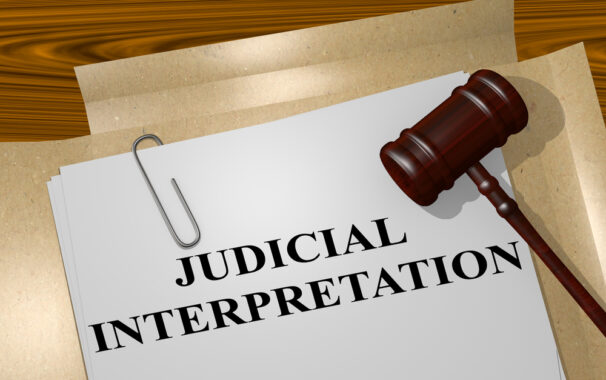
The estate documents of the decedent, Lois N. DeConca, included a revocable trust naming “Alzheimer’s Association, New Jersey,” with a Denville New Jersey address, as a beneficiary. After her death, her estate filed a Verified Complaint seeking direction from the court regarding which charity was the intended beneficiary: the National Alzheimer’s Association (AA), headquartered in Chicago, Illinois, Greater New Jersey Chapter, or Alzheimer’s New Jersey, Inc. (ANJ).
The trial judge found that ANJ had initially been affiliated with the National Alzheimer’s Association but that, after disaffiliating with the national organization, it incorporated in 2015 under the new name, ANJ. The decedent had originally created a revocable trust in 2000, naming the “Alzheimer’s Association” in Chicago as a beneficiary. However, in 2009, she revised the trust to name “Alzheimer’s Association New Jersey Chapter… Denville” instead. At the time she revised the trust, the national Alzheimer’s organization did not have a New Jersey chapter. During her lifetime, the decedent had made donations to the national charity, but those donations stopped in 2009. The trial judge concluded that the decedent had probably intended her charitable donation to benefit New Jersey residents, and ordered the distribution to be made to ANJ.
On appeal, that decision was affirmed. The doctrine of probable intent, set forth in N.J.S.A. 3B:3-33.1, is designed to carry out the “intention of a testator” with respect to wills and trusts. Where a will or trust is unclear, the doctrine “permits the reformation of a will in light of a testator’s probable intent by searching out the probable meaning intended by the words and phrases in the will.” Extrinsic evidence may be used to “furnish information regarding the circumstances surrounding the testator and should be admitted to aid in ascertaining the testator’s probable intent.” Here, the trial judge had properly relied on extrinsic evidence, including correspondence with and donations to both charities. That evidence supported the conclusion that an ambiguity did exist as to which charity was the intended beneficiary, and the judge’s conclusion that ANJ was the probable intended beneficiary was supported by that evidence: the judge had taken into account “DeConca’s use of the Denville address in the trust document and for gift-giving during her life. DeConca was aware of the address of the headquarters of the national association in Chicago, but did not use it for either purpose after 2009.”
The case is annexed here – In the Matter of the Estate of Lois N. Deconca
For additional information concerning probate litigation and will contests, visit:
Categories
- Affordable Care Act
- Alzheimer's Disease
- Arbitration
- Attorney Ethics
- Attorneys Fees
- Beneficiary Designations
- Blog Roundup and Highlights
- Blogs and Blogging
- Care Facilities
- Caregivers
- Cemetery
- Collaborative Family Law
- Conservatorships
- Consumer Fraud
- Contempt
- Contracts
- Defamation
- Developmental Disabilities
- Discovery
- Discrimination Laws
- Doctrine of Probable Intent
- Domestic Violence
- Elder Abuse
- Elder Law
- Elective Share
- End-of-Life Decisions
- Estate Administration
- Estate Litigation
- Estate Planning
- Events
- Family Law
- Fiduciary
- Financial Exploitation of the Elderly
- Funeral
- Future of the Legal Profession
- Geriatric Care Managers
- Governmental or Public Benefit Programs
- Guardianship
- Health Issues
- Housing for the Elderly and Disabled
- In Remembrance
- Insolvent Estates
- Institutional Liens
- Insurance
- Interesting New Cases
- Intestacy
- Law Firm News
- Law Firm Videos
- Law Practice Management / Development
- Lawyers and Lawyering
- Legal Capacity or Competancy
- Legal Malpractice
- Legal Rights of the Disabled
- Liens
- Litigation
- Mediation
- Medicaid Appeals
- Medicaid Applications
- Medicaid Planning
- Annuities
- Care Contracts
- Divorce
- Estate Recovery
- Family Part Non-Dissolution Support Orders
- Gifts
- Life Estates
- Loan repayments
- MMMNA
- Promissory Notes
- Qualified Income Trusts
- Spousal Refusal
- Transfers For Reasons Other Than To Qualify For Medicaid
- Transfers to "Caregiver" Child(ren)
- Transfers to Disabled Adult Children
- Trusts
- Undue Hardship Provision
- Multiple-Party Deposit Account Act
- New Cases
- New Laws
- News Briefs
- Newsletters
- Non-Probate Assets
- Nursing Facility Litigation
- Personal Achievements and Awards
- Personal Injury Lawsuits
- Probate
- Punitive Damages
- Reconsideration
- Retirement Benefits
- Reverse Mortgages
- Section 8 Housing
- Settlement of Litigation
- Social Media
- Special Education
- Special Needs Planning
- Surrogate Decision-Making
- Taxation
- Technology
- Texting
- Top Ten
- Trials
- Trustees
- Uncategorized
- Veterans Benefits
- Web Sites and the Internet
- Webinar
- Writing Intended To Be A Will







Vanarelli & Li, LLC on Social Media